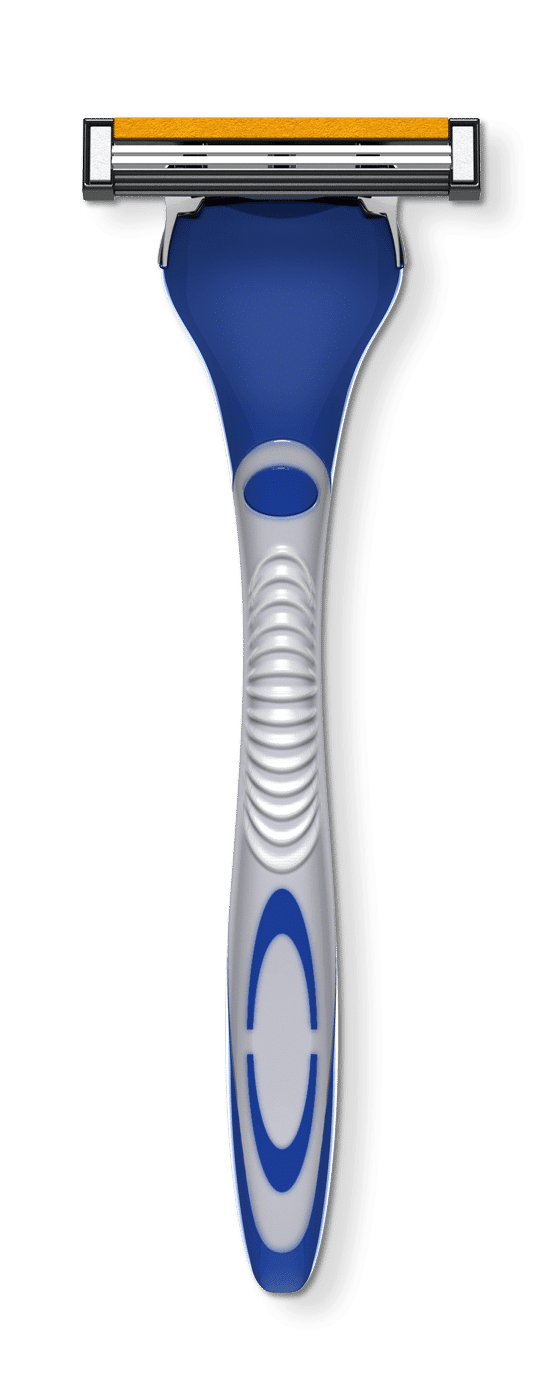The razor industry’s best-selling behemoth, Mach3 maker Gillette, and fastest-growing upstart, online subscription service Dollar Shave Club, have been at war for America’s $3.3 billion shaving business for years. But now the knives are really out: Gillette just sued, saying Dollar Shave Club stole a key part of its razor and demanding the start-up stop selling its blades.
The federal case, filed Thursday, claims Dollar Shave Club infringed a 2004 patent of a razor topped with a “chromium-containing overcoat layer,” as seen on Gillette’s Mach3, Venus, Fusion and other blades. While conducting “market surveillance” this year, Gillette says, it spotted the stolen tech in all of the start-up’s razors, including its $1-a-month Humble Twin, $6-a-month 4X and $9-a-month Executive blades.
The suit could prove disastrous for Dollar Shave Club, which blasted onto the market with a viral ad in 2012 and has become an increasing pain in Gillette’s side ever since. But it could also cast a spotlight on Gillette’s raw anxiety over its main business model, one of many traditional approaches looking increasingly wobbly in the age of online shopping.
“We’re the nunmber one razor in large part because we invest in the best technology. [Protecting] it is something we take very seriously,” said Damon Jones, a spokesman for consumer-goods giant Procter & Gamble, which owns Gillette. “A lot of hard-working scientists put their blood, sweat and tears into this, so, frankly, it’s not fair to them. And it’s not fair to shareholders that other companies would profit off technology that doesn’t belong to them.”
A Dollar Shave Club spokeswoman said Friday the company “is looking into it but doesn’t have a comment at this time.”
Gillette is the world’s top shaving supplier and controls 68 percent of the U.S. market for cheap-to-make, highly profitable razors and blades. But the Boston-based firm has slowly lost market share in recent years to online rivals, particularly as yearly increases in razor prices drive shavers and shoppers to the Web.
Dollar Shave Club’s customer base is a tenth the size of Gillette’s, but it’s blooming fast. The company has been valued by investors at about $600 million and has signed up more than 2 million subscribers nationwide. Sales at private-label shaving firms, including Dollar Shave and online peers such as Harry’s and ShaveMob, jumped 13 percent last year to $141 million, data from industry researcher Euromonitor shows.
Gillette was slow to address the threat, but it’s now clearly trying to get into the game. The company this summer debuted the Gillette Shave Club, an online subscription service it marketed with stars such as New York Giants quarterback Eli Manning just before Father’s Day.
“With more men procuring their blades and razors through e-commerce, it’s critical that Gillette establishes itself as the online leader,” P&G Chief Financial Officer Jon Moeller told analysts in October on a conference call.
Gillette invests heavily in research and development for its blades, handles and lubricating strips, spending $750 million in the late 1990s to design and build the Mach3 razor, then an additional $300 million in its first year to promote the wonders of three blades.
But the real power of that investment is in its ability to convince shoppers that Gillette’s sharpened metal can’t be replaced with, say, cheaper store-brand blades. When it released the ProGlide FlexBall last year, Gillette suggested engineers had fine-tuned the $12 swiveling razor with “optimized stiffness,” 23 percent more skin contact and the perfect level of “damping.”
Gillette has been tweaked for its ferocious guarding of seemingly inconsequential upgrades: A fake 2004 Gillette column in the satirical website the Onion addressed rivals’ Mach3 alternatives by proclaiming, “F— Everything, We’re Doing Five Blades.”
Dollar Shave Club, based in Los Angeles’s “Silicon Beach” tech hub, has also made tweaking Big Razor a main priority: Michael Dubin, the company’s chief executive, said in the 2012 ad: “Do you think your razor needs a vibrating handle, a flashlight, a back-scratcher and 10 blades? Your handsome-ass grandfather had one blade, and polio.”
But where Dollar Shave Club has excelled in buzz, Gillette has succeeded in sheer size. The company has for years sent free razors to American men on their 18th birthday, losing gobs of money on the handles in hopes of profiting long-term off refill blades.
“What you’re seeing them do is make sure they’re getting their products in front of consumers early on,” said Erin Lash, a senior equity analyst with Morningstar, “to build up that loyalty and recognition” in a way smaller start-ups can’t possibly afford.
As for critiques that Gillette is just flexing its muscles to intimidate the underdog? Jones, the P&G spokesman, swats the idea away.
“If you worked hard for something and developed a product, it’s not fair when people steal it. It’s that simple. It is cut-and-dry,” he said. “People are going to speculate – that’s their right. But it’s the idea of the guy who took your idea to the boss and got the promotion. How do you feel about that guy?”






